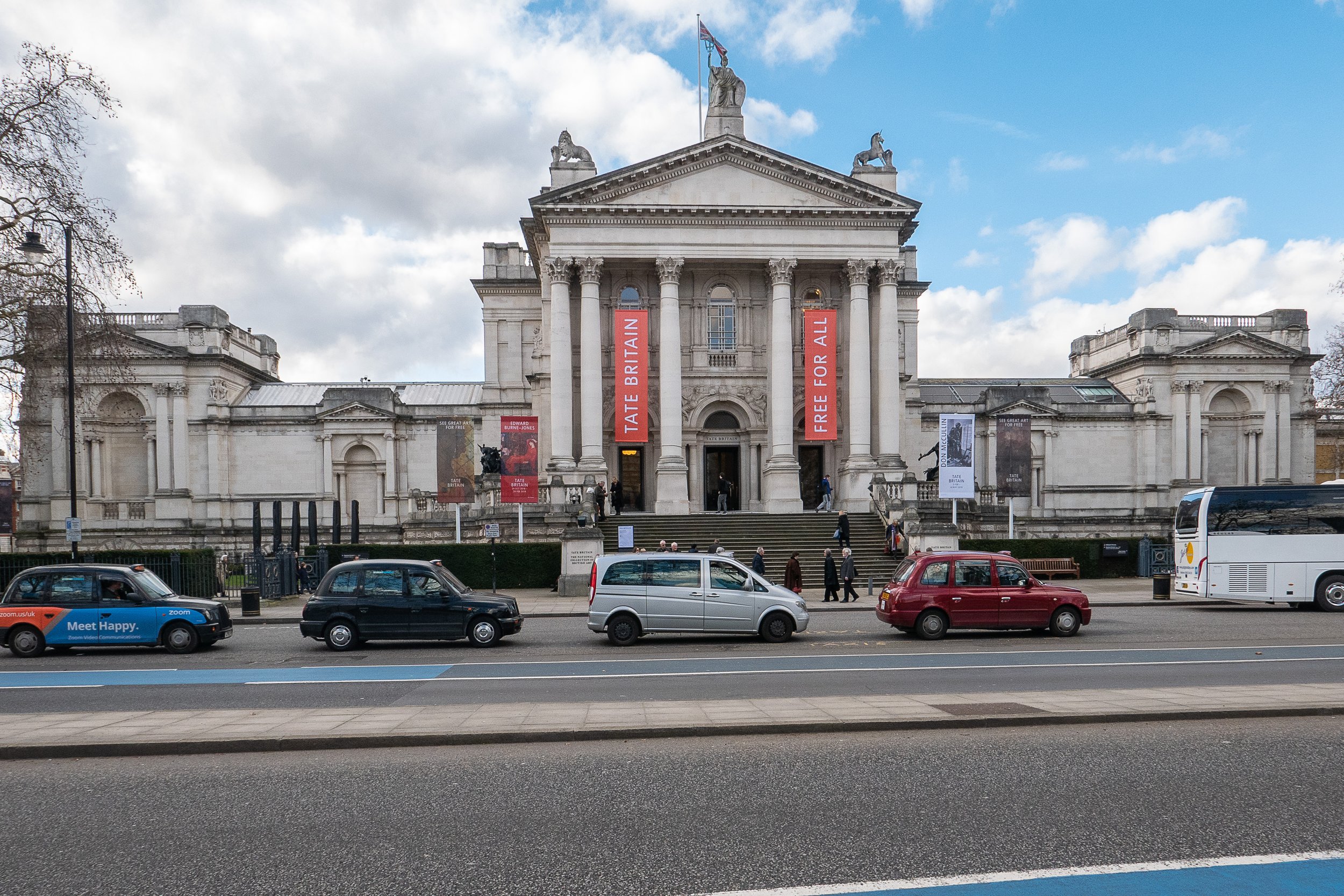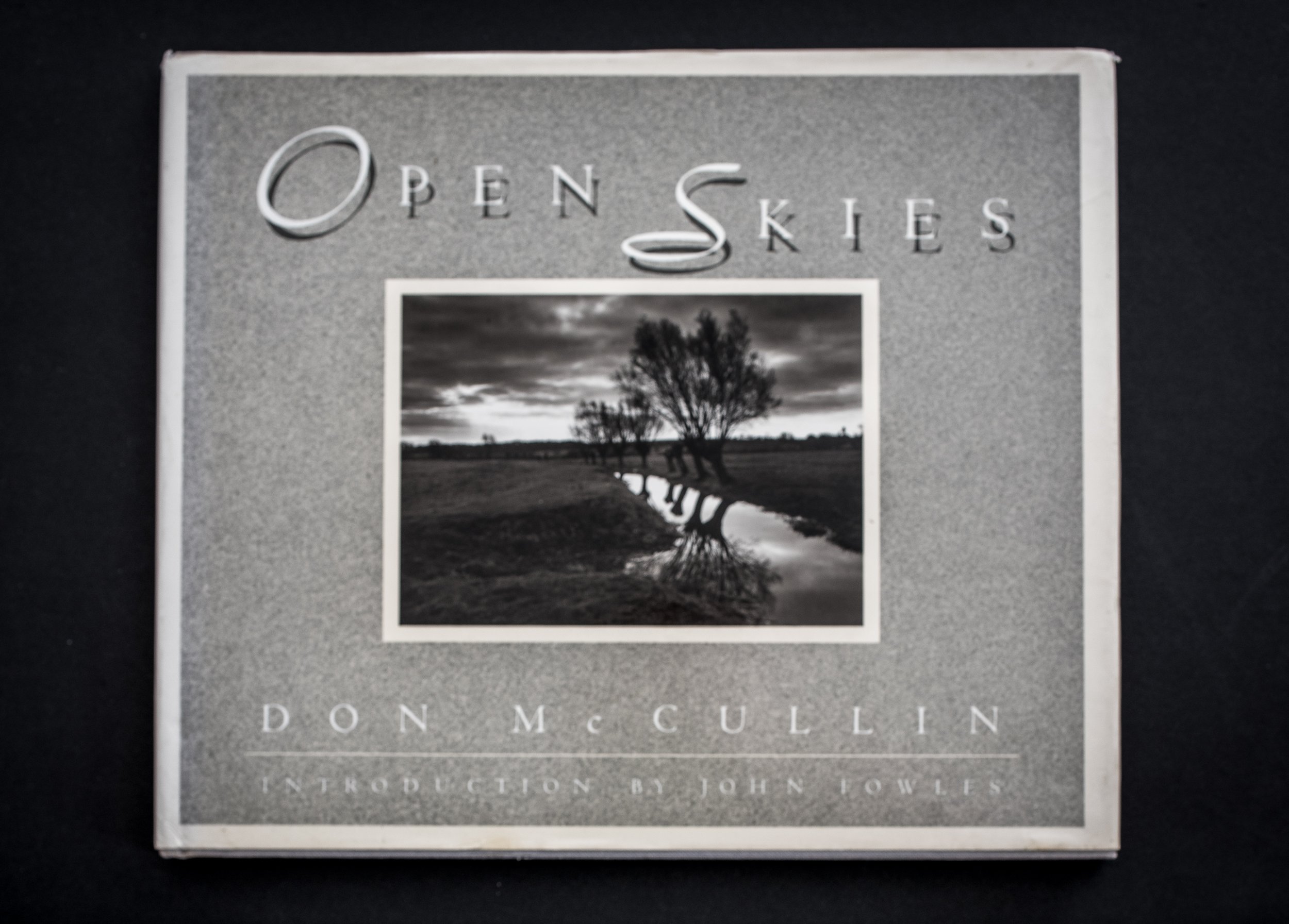 The other 'blockbuster' exhibition of photography currently showing in London, is a very substantial retrospective at Tate Britain of the work of Don McCullin, the first photographer to have been given this accolade. Built in 1892 (as the National Gallery of British Art), in contrast to the brutalist concrete of the South Bank, this is a more refined traditional Victorian art gallery with a classical portico entrance and a central dome. The layout of the exhibition also followed relatively traditional lines; exhibition quality monochrome silver gelatin prints (all printed by McCullin in his own darkroom), window mounted in plain black frames, evenly spaced as single images or in small groups and centered at eye level around the walls of eight substantial rooms. The photographs were presented in roughly chronological order, grouped geographically starting with his earliest images of gang members in east London in the late 1950's and moving on to images of conflict zones and famines in Berlin, Cyprus, the Middle East, Vietnam and Cambodia, Sudan, Biafra as well as those showing the effects of de-industrialisation, social deprivation, poverty and homelessness in London and Northern England. The captions were mostly simple place names but two or three images in each room had more detailed explanations, describing McCullin's own insights about the situations he found himself in.I already knew his work well from several of his books and having written an essay about his photography in Year 1 of the FdA course. There were no particular surprises on offer but the volume, range and power of the photographs was as impressive as anticipated, to the point of becoming almost overwhelming. These subject matter of these images is dark, moving, poignant, even shocking but the manifest empathy of the photographer for the individuals affected, the victims of these tragedies and his desire to ensure that their stories are told, totally dispels any notion of sensationalisation or exploitation. This impression is confirmed by Colin Jacobsen in his article about the exhibition in the British Journal of Photography, who also quotes Harold Evans, McCullin's former editor at The Sunday Times "He cared about the victims, the collateral damage" and "He couldn't express it in words, but he expressed it in his photography".Although the gallery was busy, the experience of being able to examine close up, the quality in the detail of these prints, from negatives exposed in often unimaginably challenging circumstances, made the journey worthwhile. This was particularly true of a group of his later photographs presented in the final room of the exhibition, some landscape images made near his home on the Somerset Levels.
The other 'blockbuster' exhibition of photography currently showing in London, is a very substantial retrospective at Tate Britain of the work of Don McCullin, the first photographer to have been given this accolade. Built in 1892 (as the National Gallery of British Art), in contrast to the brutalist concrete of the South Bank, this is a more refined traditional Victorian art gallery with a classical portico entrance and a central dome. The layout of the exhibition also followed relatively traditional lines; exhibition quality monochrome silver gelatin prints (all printed by McCullin in his own darkroom), window mounted in plain black frames, evenly spaced as single images or in small groups and centered at eye level around the walls of eight substantial rooms. The photographs were presented in roughly chronological order, grouped geographically starting with his earliest images of gang members in east London in the late 1950's and moving on to images of conflict zones and famines in Berlin, Cyprus, the Middle East, Vietnam and Cambodia, Sudan, Biafra as well as those showing the effects of de-industrialisation, social deprivation, poverty and homelessness in London and Northern England. The captions were mostly simple place names but two or three images in each room had more detailed explanations, describing McCullin's own insights about the situations he found himself in.I already knew his work well from several of his books and having written an essay about his photography in Year 1 of the FdA course. There were no particular surprises on offer but the volume, range and power of the photographs was as impressive as anticipated, to the point of becoming almost overwhelming. These subject matter of these images is dark, moving, poignant, even shocking but the manifest empathy of the photographer for the individuals affected, the victims of these tragedies and his desire to ensure that their stories are told, totally dispels any notion of sensationalisation or exploitation. This impression is confirmed by Colin Jacobsen in his article about the exhibition in the British Journal of Photography, who also quotes Harold Evans, McCullin's former editor at The Sunday Times "He cared about the victims, the collateral damage" and "He couldn't express it in words, but he expressed it in his photography".Although the gallery was busy, the experience of being able to examine close up, the quality in the detail of these prints, from negatives exposed in often unimaginably challenging circumstances, made the journey worthwhile. This was particularly true of a group of his later photographs presented in the final room of the exhibition, some landscape images made near his home on the Somerset Levels. I have a second hand copy from America of his book 'Open Skies' published in 1989, which includes these photographs and have previously felt that they were so dark that they had been over-printed, blocking up the details in the shadow areas. Having now seen these photographs 'in the flesh', the detail in the shadows has been retained, the quality is superb and I can appreciate that the problem in the book is down to the reproduction of the images, emphasising the value in being able to get to see the original prints. In his introduction to the book, John Fowles speculates that the darkness of these images is a reflection of McCullin's 'state of mind' following his years of covering human tragedies all around the world, along with the tragedies of his own personal life.Thirty years further down the line and now aged 83, McCullin commented on this in a recent television documentary for BBC Four, confirming that as he has got older, he feels the need to make his prints darker, yet his mood now seems lighter and what was most apparent was his humility and that he still cares passionately about people, regardless of their background but especially the less fortunate among us.https://www.tate.org.uk/what's-on/tate-britain/exhibition/don-mccullinJacobsen, C., "Endframe, Don McCullin': British Journal of Photography, Issue 7882, p 98, April 2019.McCullin, D., 'Open Skies': Harmony Books, New York, 1989. (Originally published in Great Britain by Jonathon Cope).https://www.bbc.co.uk/iplayer/episode/m0002dv0/don-mccullin-looking-for-england, Accessed on 10/4/2019
I have a second hand copy from America of his book 'Open Skies' published in 1989, which includes these photographs and have previously felt that they were so dark that they had been over-printed, blocking up the details in the shadow areas. Having now seen these photographs 'in the flesh', the detail in the shadows has been retained, the quality is superb and I can appreciate that the problem in the book is down to the reproduction of the images, emphasising the value in being able to get to see the original prints. In his introduction to the book, John Fowles speculates that the darkness of these images is a reflection of McCullin's 'state of mind' following his years of covering human tragedies all around the world, along with the tragedies of his own personal life.Thirty years further down the line and now aged 83, McCullin commented on this in a recent television documentary for BBC Four, confirming that as he has got older, he feels the need to make his prints darker, yet his mood now seems lighter and what was most apparent was his humility and that he still cares passionately about people, regardless of their background but especially the less fortunate among us.https://www.tate.org.uk/what's-on/tate-britain/exhibition/don-mccullinJacobsen, C., "Endframe, Don McCullin': British Journal of Photography, Issue 7882, p 98, April 2019.McCullin, D., 'Open Skies': Harmony Books, New York, 1989. (Originally published in Great Britain by Jonathon Cope).https://www.bbc.co.uk/iplayer/episode/m0002dv0/don-mccullin-looking-for-england, Accessed on 10/4/2019
